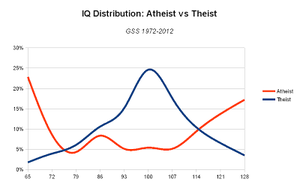Weak Atheism
 From Conservapedia
From Conservapedia 
Weak atheism (sometimes referred to as "negative atheism") describes a belief system and philosophical stance whereby a person lacks a belief in God/gods. It differs from strong atheism, which goes further than a simple lack of belief and makes an assertion that no gods exist. It also differs from agnosticism, in that a weak atheist says they do not believe in any gods, while agnostics do not know whether or not any gods exist.
Atheism, as defined by the Stanford Encyclopedia of Philosophy, the Routledge Encyclopedia of Philosophy, and other philosophy reference works, is the denial of the existence of God.[2][3][4][5] A common criticism of the concept and term "weak atheism" is that it is not a form of atheism and it is indistinguishable from agnosticism (see: Definition of atheism and Attempts to dilute the definition of atheism).
Weak atheism is based on the belief that the theist, not the atheist, bears the burden of proof to show that any God or gods exist, because it is the theist who is asserting the existence of an entity. Weak atheists typically compare belief in God/gods with belief in other equally indemonstrable beings like "flying spaghetti monsters,"[6] or "invisible pink unicorns,"[7] and argue that, "The person attempting to prove that the Flying Spaghetti Monster exists has the burden of proof. In the absence of sufficient proof to warrant belief, I am justified in disbelieving in all these beings."
As George Smith wrote regarding positive versus negative belief:
- "If one presents a positive belief (i.e. an assertion which one claims to be true), one has the obligation to present evidence in its favor. The burden of proof lies with the person who asserts the truth of a proposition. If the evidence is not forthcoming, if there are not sufficient grounds for accepting the proposition, it should not be believed.",[8]
Contents
- 1 Latin
- 2 Theistic responses to weak atheism
- 3 Additional problems with weak atheism
- 4 Weak atheism and intelligence
- 5 See also
- 6 References
Latin[edit]
The philosophy can be summed up by Latin phrases like necessitas probandi incumbit ei qui agit meaning "the necessity of proof lies with he who complains" and ei incumbit probatio qui dicit, non que negat, meaning "the burden of proof rests on who asserts, not on who denies."
Theistic responses to weak atheism[edit]
See also: Criticisms of weak atheism and William Lane Craig on attempts to define the word atheism
Weak atheism is often construed by theists as a highly negative and destructive point of view that lacks a positive alternative. As Jacques Maritain wrote:
- "By negative atheism I mean a merely negative or destructive process of casting aside the idea of God, which is replaced only by a void. Such a negative atheism can be only shallow and empirical, like the atheism of the libertians of the seventeenth century: it hollows out a vacuum at the center of the universe of thought which has taken shape for centuries around the idea of God, but it does not bother about altering that universe; it is concerned merely with making us live comfortably in the empirical freedom of doing whatever we want. On the other hand, negative atheism can be deeply and metaphysically lived: in which case the void it creates at the center of things extends to and lays waste our whole universe of thought; the freedom it claims for the human ego is absolute independence, a kind of divine independence that this ego, like Dostoievski's Kirilov, has no better way of affirming than by suicide and self-destruction."[9]
Other theists respond by saying that theists have, in fact, met the burden of proof, through arguments for the existence of God.
Other theists criticize weak atheism as seeking to "dodge the issue." Terry Miethe argued:
- "the "negative atheist" ends up denying God's existence just as much as the "positive atheist." For the believer (and in reality) to deny the idea of God is to deny the actual existence of God no matter what language game you want to play. Remember, Hans Kung is quite correct in pointing out that there is also an "atheistic language game" that is not self-justified…We must not---cannot---arbitrarily "define" out of existence vast ranges of reality simply because they do not meet our predetermined definition. It is not good enough to say that I have no idea of God therefore I am denying nothing about "his" actual existence. You must examine all of reality and answer or explain why millions have had what they thought was an adequate idea or concept of God, from great philosophers to the 'common folk.'"[10]
William Lane Craig has called the attempts to broaden the definition of atheism a "deceptive game" (See: William Lane Craig on attempts to define the word atheism).[11]
Additional problems with weak atheism[edit]
See also: Criticisms of weak atheism
Brain research data, social science data relating to beliefs of atheists concerning purpose/design, social science data about atheist populations and recent responses of atheists to Christian apologetics poses significant problems to the concept of weak atheism (see: Criticisms of weak atheism).
Weak atheism and intelligence[edit]
See also: Weak atheism and intelligence abd Atheism and intelligence

Citing data from the General Social Survey, Theodore Beale writes about atheist intelligence quotient (IQ) scores:
| “ | "..the two most common types of atheists are the High Church atheists with +2SD IQs (128+) and Low Church atheists with -2SD IQs (65-72). Note that the Low Church atheists actually outnumber the High Church atheists, 22.9 to 17.2 percent...
Now, the statistically naive might look at this chart, note that the +2SD theists only account for 3.5 percent of the theistic population, and assume that this means there are more highly intelligent atheists than highly intelligent theists. This is not the case. As it happens, there are 11.4x more +2SD theists who either know God exists or believe God exists despite having the occasional doubt than there are +2SD atheists who don't believe God exists.[13] |
” |
Social scientists use variant definitions of atheism.[14][15]
In his article How Many Americans are Atheists? Fewer than You Might Think, Bradley Wright wrote:
| “ | Another quality measure is offered by the General Social Survey, probably the best-known, most rigorous social survey out there. It gives respondents a series of statements about their beliefs in God, and it asks which come closest to what they believe. The 2010 survey found that:
• 3% of Americans “don’t believe in God.” • (Another 6% reported that they “don’t know whether there is a God and don’t believe there is any way to find out,” i.e., agnostics.)[16] |
” |
As noted above, describes a belief system and philosophical stance whereby a person lacks a belief in God/gods. Using this very broad definition of definition of atheism, there are atheists who argue that babies are atheists (Of course, atheists cannot verify what is in the minds of babies).[17] Also, using this very broad definition of definition of atheism, it could be argued that individuals with severe mental disabilities and/or individuals born with extremely low IQs are more apt to be weak atheists (Of course, this also would be difficult to verify in many cases). This helps explain why the General Social Survey (GSS) data has twice as many low IQ atheists as high IQ atheists.
See also[edit]
- Implicit and explicit atheism
- Atheism and evidence
- Atheists doubting the validity of atheism
- Atheist factions
- Atheism
- Strong atheism
- Atheism and cowardice
- Atheism and presumptuousness
References[edit]
- ↑ Are babies born atheists? by Matt Slick
- ↑ Stanford Encyclopedia of Philisophy - Atheism and Agnosticism
- ↑ Is Atheism More Rational? by Creation Ministries International
- ↑ Day, Donn R. (2007). "Atheism - etymology".
- ↑ Definition of atheism by William Lane Craig
- ↑ http://www.venganza.org/
- ↑ http://www.invisiblepinkunicorn.com/
- ↑ Atheism: The Case Against God, by George H. Smith
- ↑ Jacques Maritain, On the Meaning of Contemporary Atheism, The Review of Politics, Vol. 11, No. 3, pp. 267-280, July, 1949.
- ↑ http://www.thedivineconspiracy.org/athart3.htm
- ↑ Definition of atheism by William Lane Craig
- ↑ Mailvox: The distribution of atheist intelligence
- ↑ Mailvox: The distribution of atheist intelligence
- ↑ Do Atheists Really Have Higher IQs than Believers?, Dr. William M. Briggs
- ↑ How Many Americans are Atheists? Fewer than You Might Think by Bradley Wright, January 26, 2012
- ↑ How Many Americans are Atheists? Fewer than You Might Think by Bradley Wright, January 26, 2012
- ↑ Are babies born atheists? by Matt Slick
| |||||
↧ Download as ZWI file | Last modified: 02/16/2023 10:17:52 | 125 views
☰ Source: https://www.conservapedia.com/Weak_Atheism | License: CC BY-SA 3.0
 ZWI signed:
ZWI signed: KSF
KSF